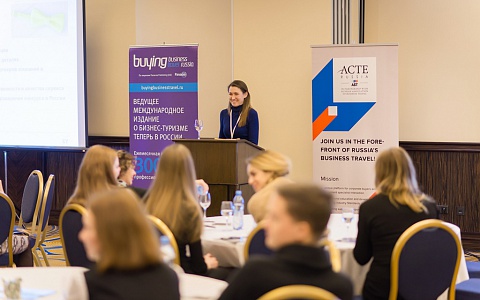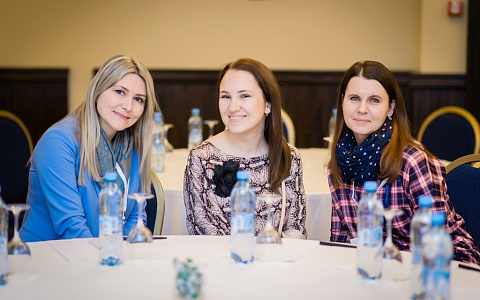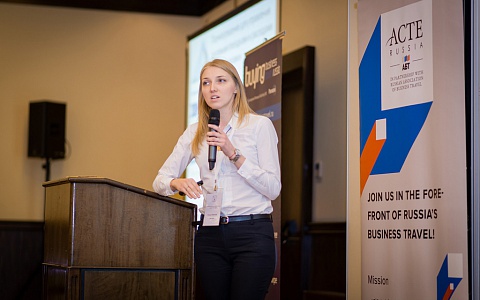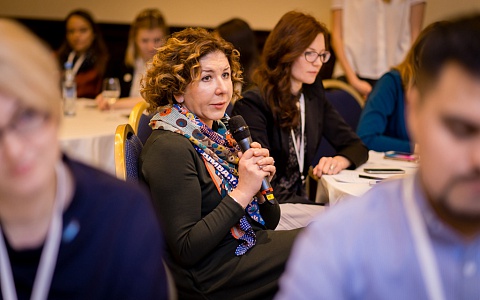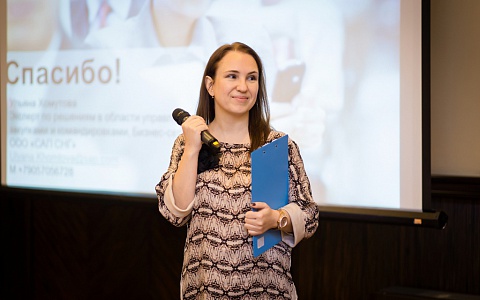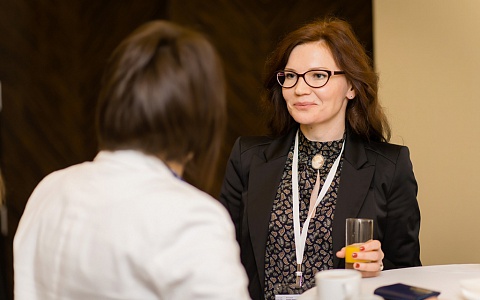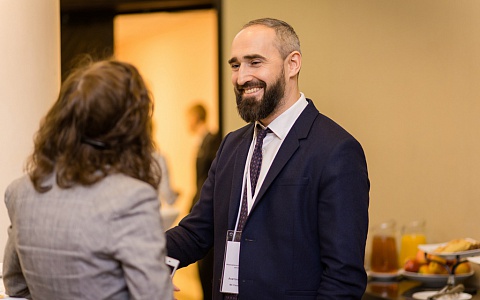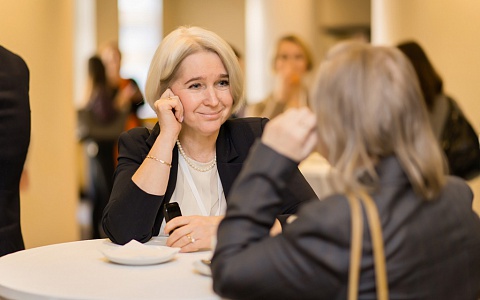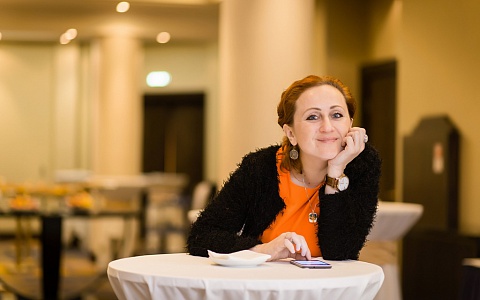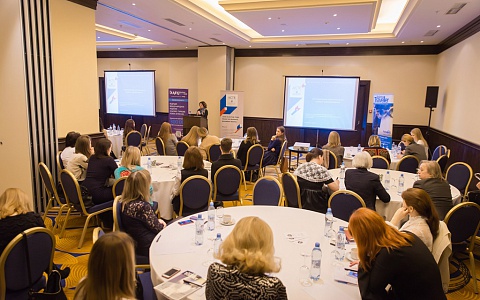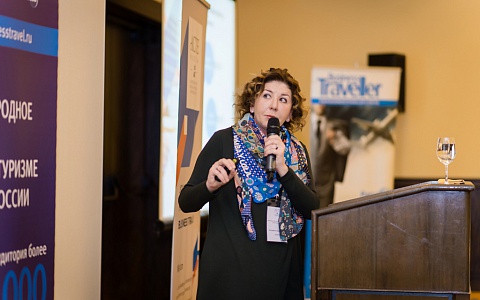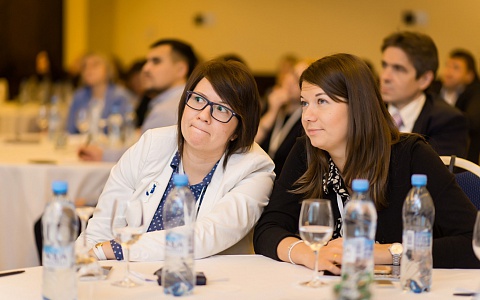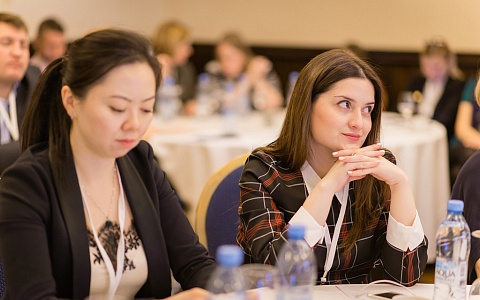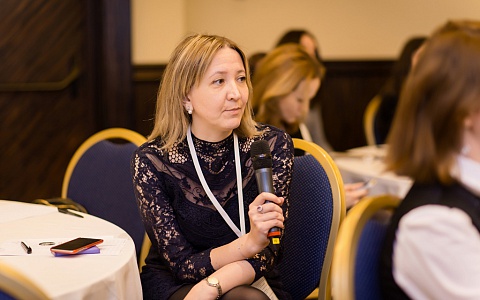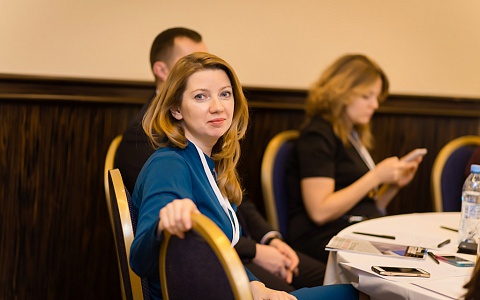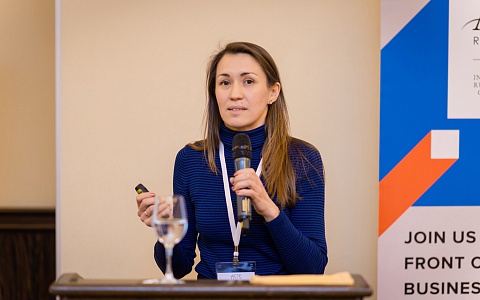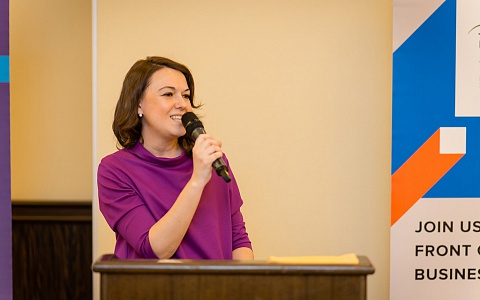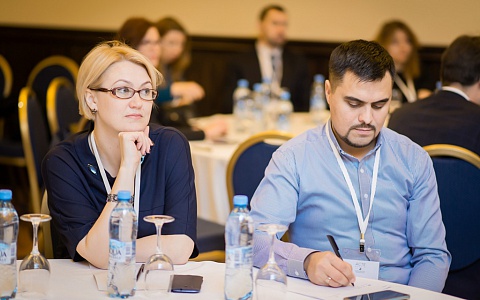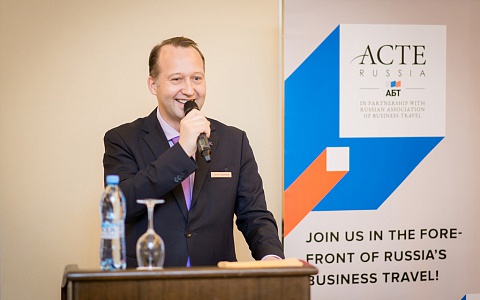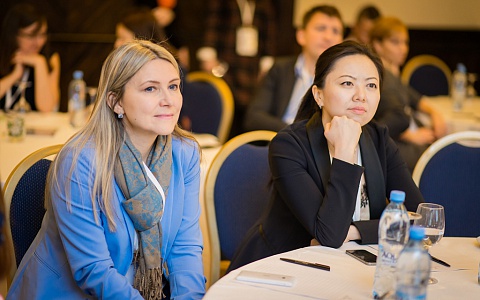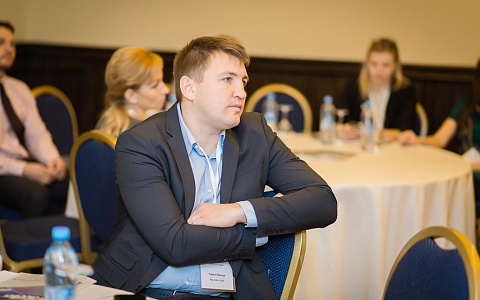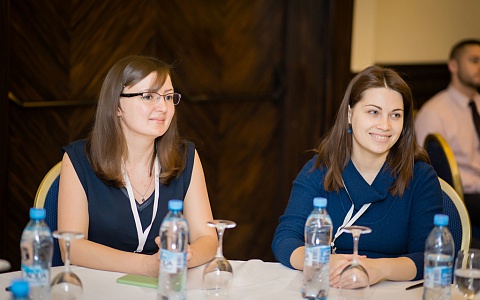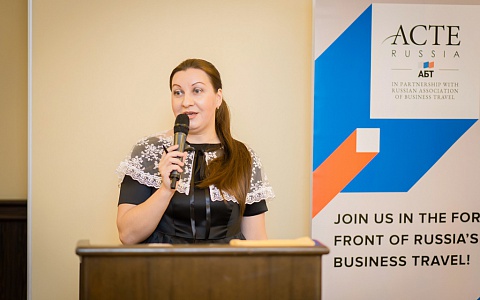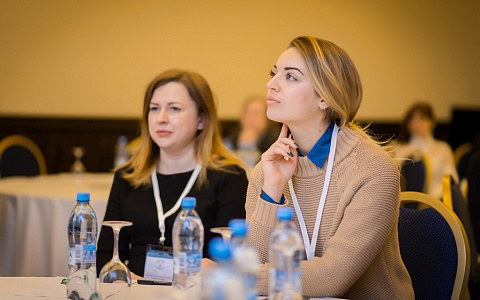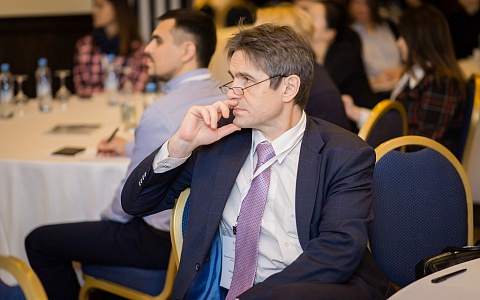ABT-ACTE Russia closing session: “The wind of change has blown, but we need a storm!”
The expiring 2016 has been the year of travel budget optimization and tough control for Elena Lobanova, head of protocol and business support department of Uralkali. However, the same is true for the majority of other business travel experts. This is what they spoke about at ABT-ACTE Russia session, devoted to the results of the year, that was held in Renaissance Moscow Monarch Centre on December 12.
“The crisis persists, the economy is still at the bottom of the Mariana Trench. But business travel is climbing up already!”, Ms Lobanova is convinced. “After a period of business decline in 2014-2015 the market has started recovering. And unlike MICE, the amount of business trips in our corporation did not decrease substantially, sometimes it even grew. This year we have focused at direct booking, payment with corporate cards and the increase of the share of online bookings”.
Elena noted that, just for the sake of economy, many corporations in Perm region allowed business travellers to book their trips themselves on any resources not covered with their travel policy, changed their staff`s flights from business to economy class, cut accommodation limits.
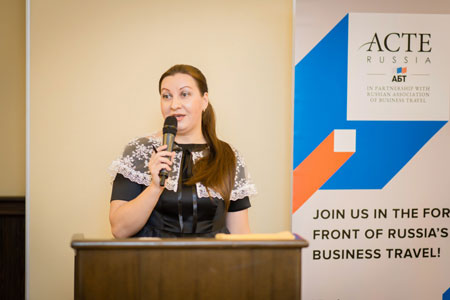
As for the discovery of the year, “the days that made the world reel”, Elena named BBT Awards Russia & CIS, the rumours of which reached all the corners of the country. The expert held a special opinion poll among her colleagues before the closing session and named top three most important events of the business travel industry according to the staff of Perm companies.
The leader was the “return” of Turkey (flights to this country were resumed). The third place went to cancellation of business trip permits and duty assignments, which facilitated document flow and report preparation after the business trip. “Although the government decree on these changes was issued as early as in June 2015, many companies decided to take time”, Ms Lobanova explained.
And the silver medalist was ABT-ACTE Russia and its educational sessions. “The Association “made a landing” in the regions and in some of them even two events were held during the year”, the speaker stressed.
In Ms Lobanova`s opinion, it was very important, because the business travel industry in the remote corners of the country lacked not only visa centres, modern airports and airlines, but also access to knowledge. “All this is the might of small steps”, the expert supposes.
Elena also pointed out business travel growth areas in the regions. Thus, in 2016 Pobeda airline launched flights to foreign destinations from different cities, new hotels opened in Tyumen, Yekaterinburg, Irkutsk, Ulyanovsk, Nizhny Novgorod and other cities, hotels were focused on improving facilities and conditions for business travellers – by the word, regional hotels are number one in Internet quality. “We feel the wind of change blow towards the regions, but we want a storm! I hope, it will reach us due to meetings like this”, Elena Lobanova said.
It should be noted that disturbance in the business travel market this year, like last year, has been largely caused by a dramatic upturn in exchange rates. Anna Nazarova, analyst of market research department of Rosbank spoke about the causes of volatility.
The expert mentioned three main factors that affected the exchange rate. First of all, sanctions and a decrease in Russia`s appeal for investors limited dollar borrowings abroad, which boosted the demand for the American currency. And on the contrary, foreign investment outflow led to a drop in ruble demand.
The second factor was a drop in oil prices. “Low oil revenue was compensated with devaluation, because about 50% of state budget consisted of oil revenue of oil exporting companies”, Anna explained.
And the third cause – changes in the policy of the Bank of Russia. “The Central Bank used to support the exchange rate within a certain range. But from 2014 onwards, the Central Bank switched to the new policy of targeted inflation. In other words, now its aim was to support not the exchange rate itself, but economic stability and a certain inflation rate in the country. This switch coincided with a period of instability, which also caused volatility”, Ms Azarova said.
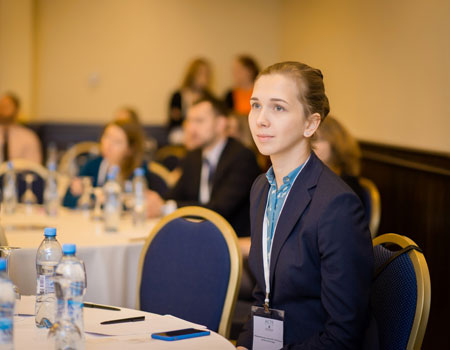
However, the process of the Central Bank influencing the exchange rate by means of the key rate has already been adjusted, there is a rally in the oil market, Russia`s economic growth and its investment attractiveness have been restored – all this lets Rosbank analysts come to quite an optimistic conclusion: exchange rate volatility will be low, and inflation – at approximately 5%.
“Nevertheless, we do not expect sanctions on Russia to be eased, at least in the next year. Besides, the burden on the state budget is growing nowadays, so even oil price growth up to 70 dollars a barrel will not let the exchange rate drop below 55 rubles, because the existing deficit needs to be compensated. There are forecasts of America`s economic growth, which will result in investment outflow from Russia. We are heading for the promising future, but unfortunately, we will never return to the exchange rate of 2014”, Anna noted.
How will the travel industry feel? In the expert`s opinion, lower volatility will let companies better plan their business trip and event costs, the demand for foreign destinations will grow.
Technologies help travel managers in business trip planning, be it a business trip abroad or within Russia. What should an IT solution be like? Ylyana Khomutova, purchase and business travel solutions expert of SAP CIS supposes that it should be simple in the first place. Second, it should guarantee travel policy compliance. “The traveller wants to book a trip and not to think whether he infringes the rules or not. And the company needs to trace trip provision compliance “at the zero point” – when invoices have already been received, it makes no sense”, Ms Khomutova said in her speech.
In the third place, in the expert`s opinion, the platform should enable creation of partner business network, include offers of many providers. “I want to have 15 options, and not 10, to have the same scope of information when I book a business trip, as the scope of information I analyze when I choose a hotel for my holiday. Some of my colleagues make Excel tables in order to choose a hotel for their vacation”, Ylyana added.
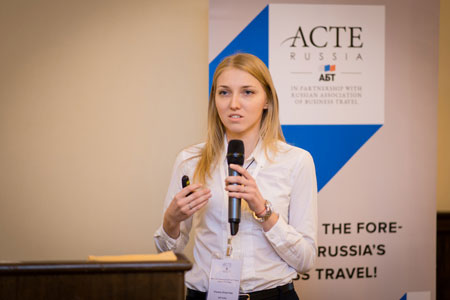
As the expert stressed, cloud technologies had come to the fore nowadays – they are more cost-efficient for companies. “You should choose a booking tool that could be integrated with your systems, so that your employees do not have to fill in invoices by hand, and that could be accessed from mobile devices”, Ms Khomutova noted.
Elizaveta Grigorieva, head of business travel department of Lanit Group of companies shared her experience in business travel department optimization. “The structure of a travel department may vary, but no matter what it is like, we are in close contact with all the departments of the corporation. And our task is to find a balance between service and control, as we are at the intersection of competing interests”, the expert said.
Elizaveta pointed out two main structures of travel department organization. In the first one, it is a separate unit, with a procurement manager, a booking specialist, an accountant, etc. The advantage of such a system, in Elizaveta`s words, is direct management, and the disadvantage is loss of communication with operational departments of the company. Moreover, the first structure tends to grow, because there start to appear managers in it responsible for a certain department.
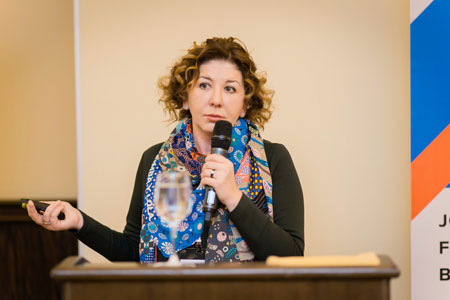
The second variant implies a small department that is responsible for work with providers, tenders, agreement conclusion, OBT introduction and other global tasks. And every large department of the company has its own one or two travel coordinators. This structure provides ideal communication between the departments. This is the scheme used in Lanit Group.
The expert noted that OBT could easily be introduced in such a structure. Another advantage consists in the fact that the travel department costs much less in this case, because all the operational staff is on the department balance sheet. Besides, if there are only a few business trips, the employee can combine functions of a travel coordinator and those of a secretary or an office manager. The disadvantage of such a structure is management complexity. “It is hard to introduce innovations, because all these specialists do not respond to you directly”, Elizaveta explained.
The main tasks of a travel department, according to the speaker, remain the same in any case: communication with providers, general structures of the company, business travellers, as well as reports and analysis. Ms Grigorieva is also convinced that the main source of economy consists in the optimization of internal business processes and work with internal customers. “Travel policy is the main tool. In my experience, this document should have no more than five pages. Of course, the simplest way to make the rules be observed is to include them in an OBT”, Ms Grigorieva advised.
Svetlana Blazhevich, head of business travel department of Technoserv, added that one of the ways to optimize travel costs, everyone forgets about all the time, is to reduce the number of tickets returned. “As the result of our work with business travellers, we have reached the rate of 1%, which is a huge economy! Now it is the travellers themselves, who pay closer attention to the fact whether they need a fare with luggage included or not, whether meeting dates may change or not”. You should also remember about the daily allowance: employees who leave for a business trip at weekend account for an extra compensation, so there should be a rational approach to business trip planning.
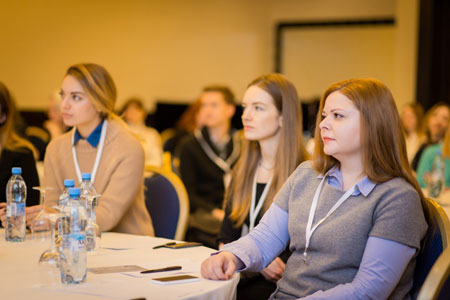
What is the way to plan an ideal event for 200 guests? Many followed the results of the Entrepreneur Of The Year International Contest arranged by EY, which was held in Russia for the 14-th time in 2016. Event manager of EY Ludmila Budanova spoke about ins and outs of the process of the gala awarding ceremony that took place in Shelk event hall on November 23.
In the expert`s words, they managed to take the venue at a good price due to the fact that an agreement for four events was signed. Despite the fact that the project was carried out in close cooperation with an agency, the event department of the company took active part in event arrangement as well.
Ms Budanova noted that program elements matched the concept that was chosen this year: “Business Bandmasters”. Thus, there was live GQ Orchestra on the stage and the minimum number of intermediate performances. A robot greeted guests in the welcome zone. Audience involvement was increased by a mannequin challenge – a flash mob making its participants suddenly freeze in different positions.
Besides, this year the organizers refused from the services of a professional master of ceremonies. “The ceremony was conducted by three pairs of our stockholders. It took them as long as a month and a half to rehearse, but they finally did a great job!” the speaker shared her impressions. We also decided to place the prizes right on the scene: as long as they were given, passions were rising.
“We also sold tickets to the ceremony for the first time ever – of course those willing to buy them were carefully chosen. Twenty seats were sold in such a way. And we may make the ceremony open in the future, admission will be by tickets”, Ludmila said.
As for Ekaterina Lipatova, travel coordinator of Valeant LLC, the session turned out to be a perfect opportunity to get really useful information, learn more about the awarding procedures held before and to feel joy for the colleagues, award winners. “I would like to particularly mention the speech of Anna Azarova on exchange rate volatility and Elizaveta Grigorieva – it was interesting to learn about another approach to travel department arrangement”, Ms Lipatova noted.
The main events of the expiring year, in Ekaterina`s opinion, include introduction of non-luggage fares on the territory of Russia, reduction in the number of evens held outside the CIS, as well as Buying Business Travel Awards Russia & CIS.
“It is nice to gather in the company of travel experts to sum up the results of the expiring year. The most important for me were the speeches on travel department optimization, as well as on IT solutions for business trips”, Viktoria Nikolaeva, marketing communications manager of Reynaers Aluminium RUS shared her opinion.
The year has been very busy for Viktoria. Among other things, against the background of budget optimization by more than 70%, the company has held several events for customers and partners in the form of a game with an exhibition area and sponsors, as well as events in the destinations that were new for the corporation – The Baltic States, Serbia, Slovenia.
Natalia Travova
